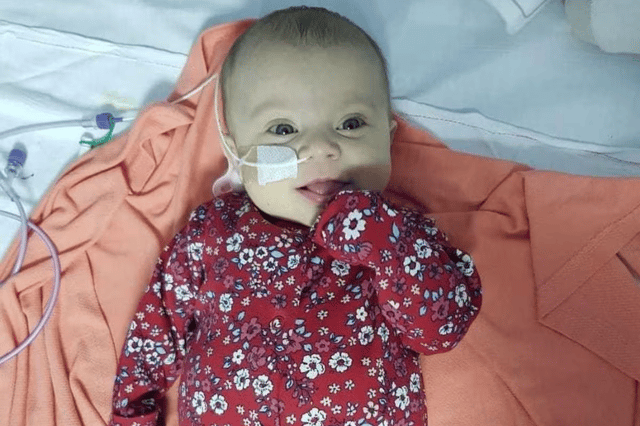Telford couple share daughter's battle with rare liver condition to raise awareness on 'Big Yellow Friday'


A couple hope that sharing the story of their poorly daughter will help raise awareness for childhood liver disease. Today (March 1) is 'Big Yellow Friday' - a day to raise funds and awareness for the Childhood Liver Disease Foundation. Each week in the UK, 20 children are diagnosed with liver disease. There is currently no cure for childhood liver disease, a diagnosis means a lifetime of medical care.
The parents of one of those children, 18-month-old Luna Williams, are hoping sharing her story will help raise awareness for the disease, charities and health staff that have helped their families through the last 18 months. Luna was diagnosed with Biliary Atresia - a rare condition in infants in which the bile ducts outside and inside the liver are scarred and blocked. Luna's dad, Jordan, 31, from Telford in Shropshire, explained how Luna received her diagnosis: "When she was born she had quite a bit of jaundice so she was on the neonatal unit under the blue light. When she was about two weeks old our health visitor said she noticed Luna was still a bit jaundice, and advised us to go the jaundice unit. A lot of things were found relating to her liver so we were referred to Birmingham."
Advertisement
Hide AdAdvertisement
Hide AdAfter a 10-day stay and a multitude of tests, Luna had to undergo a Kasai procedure. The operation involves a surgeon removing the damaged bile ducts and using a loop of the small intestine to replace them.
Without surgical treatment, most infants develop cirrhosis within six months and liver failure within a year. Fewer than 10 per cent of children who don't receive treatment live past the age of three. While the operation was a success, little Luna has been in and out of hospital ever since. One stint last year saw her spend four months at Birmingham Children's Hospital.
"The staff at Ronald McDonald House were great, but it was difficult," Jordan explained. "We had three other kids at home, it was a struggle. Since then it's constant hospital visits, every time she gets a temperature of over 38 she gets taken into hospital where she'll be on IV antibiotics for seven to ten days.
"You wouldn't think anything is wrong with her, but she'll need a transplant at some point in her life. The condition can cause other things like an enlarged spleen and a lot of other issues. It's a case of keeping her strong and keeping her healthy until the transplant, that means she'll be in the best possible position for it."
Advertisement
Hide AdAdvertisement
Hide AdWhile handling Luna's condition has been challenging for the family of six, Jordan and his partner Sophie say the support they've had has been essential: "Through the whole thing, we've had loads of help with Birmingham hospital, Ronald McDonald, the Childhood Liver Disease Foundation.
"But we want to bring more awareness to it. Biliary atresia is a rare disease, we've been told a lot of people don't go to the scan when recommended. If we didn't, we never would have known. So even if a couple more people become aware, they might go too."
More children in the UK are diagnosed with liver diseases than childhood leukaemia, and there are over 100 different liver diseases that can affect babies, children or young people. To make a donation to the charity that help supports families and fund research, or to find out more information, visit: childliverdisease.org
Comment Guidelines
National World encourages reader discussion on our stories. User feedback, insights and back-and-forth exchanges add a rich layer of context to reporting. Please review our Community Guidelines before commenting.